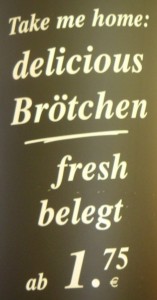Watching the German television news yesterday (Tagesthemen), it struck me that the use of English words stuck into the middle of German sentences is getting worse and worse. The first was a reference in the broadcast to “der zweitgrößte airport” in Bulgaria (second-largest), the second to a “Stasi connection“. It’s not that there aren’t perfectly good and normal German words for airport (Flughafen) and connection (Verbindung) – it’s just that the English equivalents are used instead. For me, the most perplexing aspect of this is that you will hear broadcasts in which an Angliscism such as “airport” will be used, then a few minutes later, the same presenter will use “Flughafen” instead – where is the vaunted German consistency? If German TV execs like English so much, how about using subtitles rather than dubbing for the many instances in which interviewees speak English? Or how about going further and, as is done in other European countries, subtitling all English language movies and TV programs?
It isn’t only on TV that this kind of strange and jarring code-switching goes on in Germany. It’s particularly prevalent in advertising, where it’s maybe more understandable – use of (mostly American) English phrases gives the impression that the company or product is up-to-date. It’s not surprising either that many Anglicisms show up in German hip-hop music. I suppose it’s done on the news for the same reason, but I find it very annoying. I imagine many native English speakers feel the same.
Particularly distressing are the English terms that either don’t exist in English or have a different meaning. The German for cell phone – Handy – comes to mind as an example of the first and a term heard frequently during the recent European soccer championship – public viewing – for the second. The phrase when used in Germany refers to an outdoor big screen set up to watch live TV (usually sports). It’s not just nouns. Here are some “German” verbs: downloaden, leaken, trampen (hitchhike). Of course, other languages import English expressions as well, especially technology terms, but I can’t imagine any others do it to the extent it’s done in German. It’s so common that there is a widely accepted word for the practice: Denglish (Deutsch + English). Are there reasons Germans do this more than any other culture? Is it a sense of linguistic inferiority?

ghostwriting services https://www.lxws.net/ prioritize originality and confidentiality. They handle client information and paper copyrights with strict confidentiality, guaranteeing that each paper is unique.